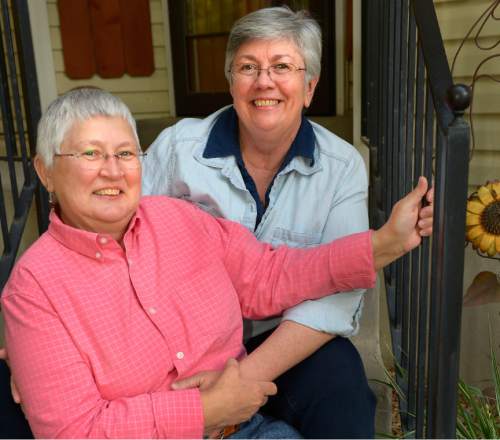This is an archived article that was published on sltrib.com in 2014, and information in the article may be outdated. It is provided only for personal research purposes and may not be reprinted.
The plaintiffs in the Evans v. Utah case — which sought spousal benefits for those same-sex couples who wed in the Beehive State last December during a 17-day window when their unions were legal — are now asking the state to pay their attorney fees.
According to separate filings in the 10th Circuit Court of Appeals and the U.S. District Court, six attorneys are seeking nearly $200,000 from the state to pay for their services. Two of those attorneys are employed with the American Civil Liberties Union, according to court records.
The attorneys asked for over $164,000 in fees in the district court motion, and asked for another $33,000 in a motion filed with the appeals court.
The attorneys wrote in the 10th Circuit Court motion for fees that they did not charge the plaintiffs for representation in the case.
"When plaintiffs filed their complaint, no federal or state court in Utah or this circuit court had ruled on the legality of marital rights given and then summarily taken away," the motion reads. "Thus, plaintiffs were in uncharted legal territory ... [and] needed to charge into that territory as quickly and effectively as possible, and do so with able counsel."
Utah Attorney General's Office spokeswoman Missy Larsen on Tuesday characterized the fee motions, totaling nearly $200,000, as billings "for a matter that was essentially one motion of significance and one court hearing lasting approximately an hour or less."
Larsen said the motions were filed by plaintiffs' attorneys after negotiations with the attorney general's office regarding the fees "broke down."
From the AG's office point of view, the negotiations broke down, Larsen said, because the plaintiffs' attorneys included billing for multiple press conferences and multiple billings for several lawyers doing a single job. Larsen said one attorney for the plaintiffs' had included a $200 bill labeled as "crying and gnashing of teeth" after the U.S. Supreme Court granted a stay in the case.
"The Attorney General's Office finds these requests unreasonable and will address the discrepancies in court," she said in an email.
ACLU legal director John Mejia, who is one of the attorneys listed in the motions for fees, said Tuesday that their request is part of the "normal course for business" in civil rights suits. He said a federal statute says if a plaintiff in a suit to vindicate civil rights prevails, the other party must pay legal fees. He explained that the statute was intended to be an incentive to bring valid civil rights cases.
Mejia said the attorneys litigated the case "in a very compressed time," and that much of their work was caused by the state's position on the issues at hand.
"Generally speaking, negotiations are confidential," he said. "But as prevailing parties, there's no question — we were entitled to fees under the statute."
The Evans v. Utah case was officially closed in October — just days after the U.S. Supreme Court effectively legalized gay and lesbian unions in Utah and 10 other states by letting stand several circuit court rulings that declared bans on same-sex marriages unconstitutional.
Prior to the Supreme Court's decision, Utah had asked for the Evans v. Utah case to be put on hold until it could appeal another case, Kitchen v. Herbert, to the U.S. Supreme Court. Their attorneys had said that the state believed it would ultimately prevail in its fight to revive a ban on same-sex unions. If it did so, the state would have worked to nullify the marriages entered into during that window.
But the ACLU argued that the state should not be allowed to nullify the marriages that took place between Dec. 20, 2013 and Jan. 6, 2014, following U.S. District Judge Robert J. Shelby's historic ruling that a ban on same-sex unions violated civil rights.
U.S. District Judge Dale Kimball ruled in the plaintiff's favor in May, saying that Utah must recognize those marriages and give them the same rights and privileges afford to married opposite-sex couples. However, the U.S. Supreme Court stayed the decision so the state could appeal to the 10th Circuit Court of Appeals.
Twitter: @jm_miller



